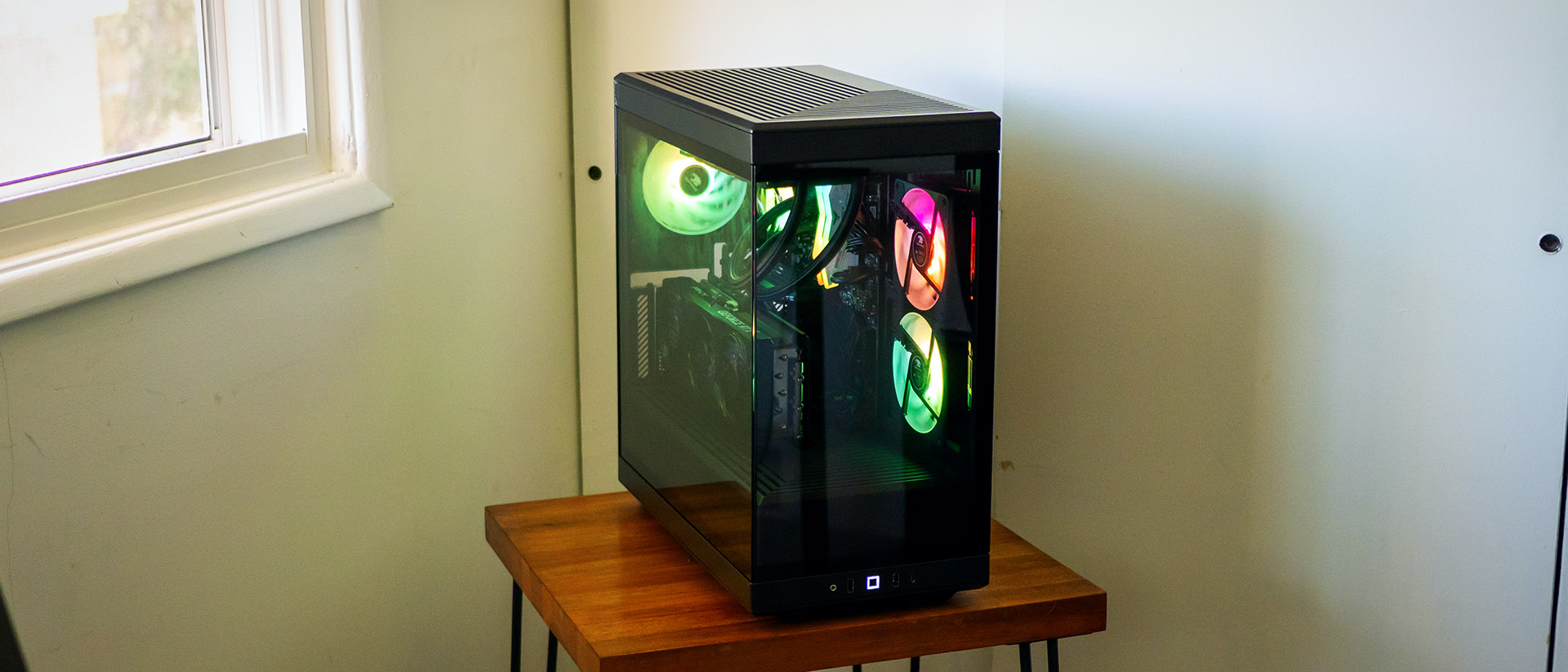Tom's Hardware Verdict
The iBuyPower Y40 Pro delivers eye-catching design and solid gaming performance, but its limited expandability and intrusive fan noise make it better suited for style-focused users than serious upgraders.
Pros
- +
Attractive, RGB-lit design
- +
Many available configurations
- +
Decent peripherals
Cons
- -
Noticeable fan noise
- -
Limited storage and PCIe expansion
- -
Only some RGB customization
- -
Power supply isn't modular
Why you can trust Tom's Hardware
iBuyPower casts a wide net with its desktop lineup, aiming to please everyone from frugal shoppers to hardcore enthusiasts. And while it often delivers, the Y40 Pro, reviewed here ($1,899.99 as tested, on sale for $2,099.99), raises a few eyebrows. Its aquarium-like glass shell and RGB-lit interior certainly make a statement, and the performance appears promising at first glance. But the focus on aesthetics brings compromises that may lead you to look elsewhere.
Design of the iBuyPower Y40 Pro
As the Y40 Pro's name suggests, the system is built in Hyte’s Y40 chassis, a more compact, pared-down sibling to the Hyte Y60 found in the iBuyPower Y60 Pro. (Hyte is owned by iBuyPower.) Aesthetics take center stage here. The borderless glass panels on the front and sides evoke a fishtank-like display, offering an unobstructed view of the internals. Its dimensions of 18.58 x 17.28 x 9.44 inches (HDW) are standard mid-tower fare.
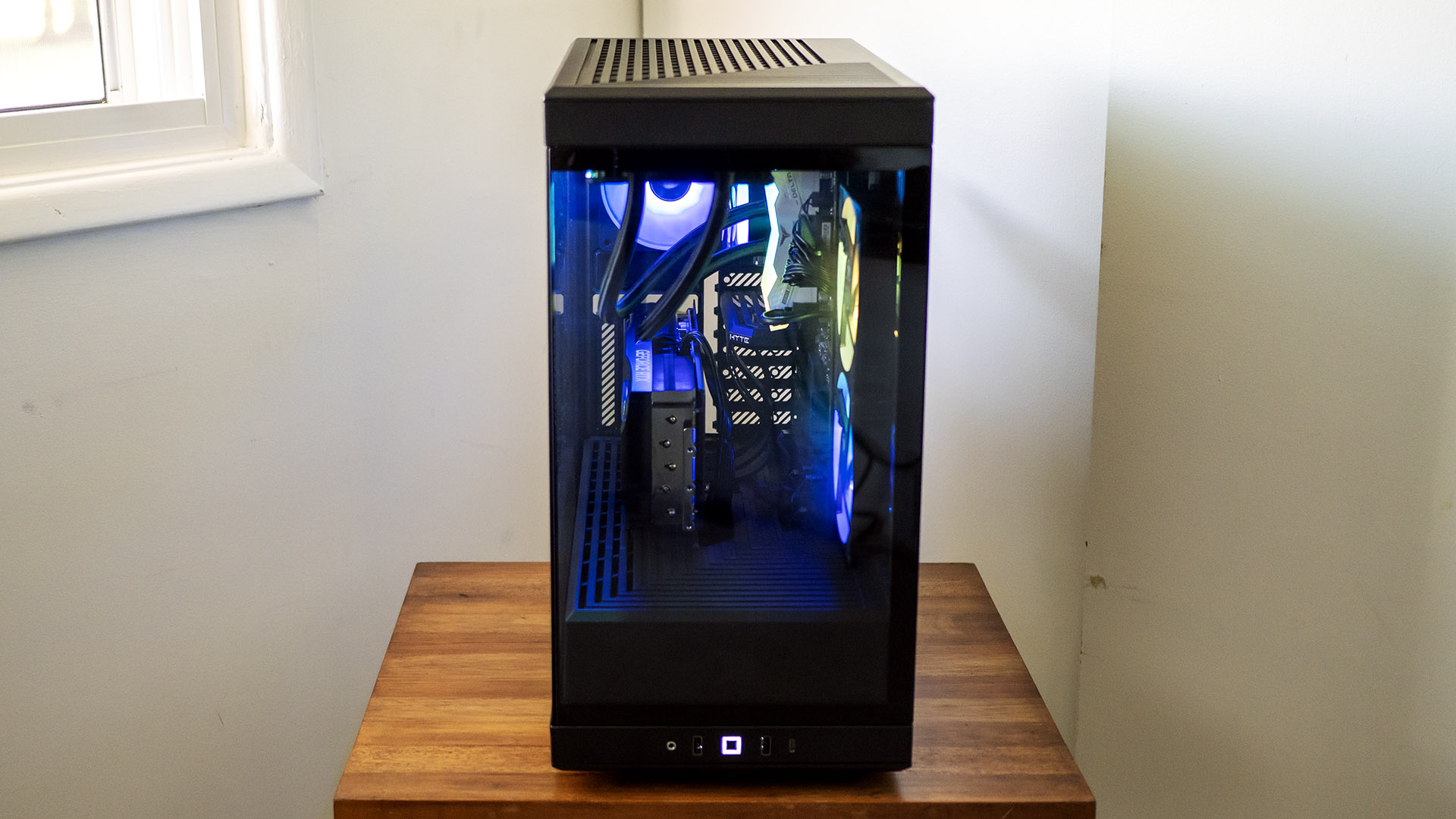
The tower is equipped with five 120 mm RGB fans: two side intakes, one rear exhaust, and two mounted on its own 240 mm liquid CPU cooler. RGB lighting extends to the cooler’s waterblock and the system’s RAM, creating a cohesive glow throughout the build.
To manage the lighting, I had to manually install MSI Center. Identifying which fans were mapped to which headers eluded me, but the “Select All” function allowed me to apply settings across all zones simultaneously. That’s slightly disappointing – being able to control individual zones would have allowed more personalization. The RGB DIMMs, however, can be independently controlled.
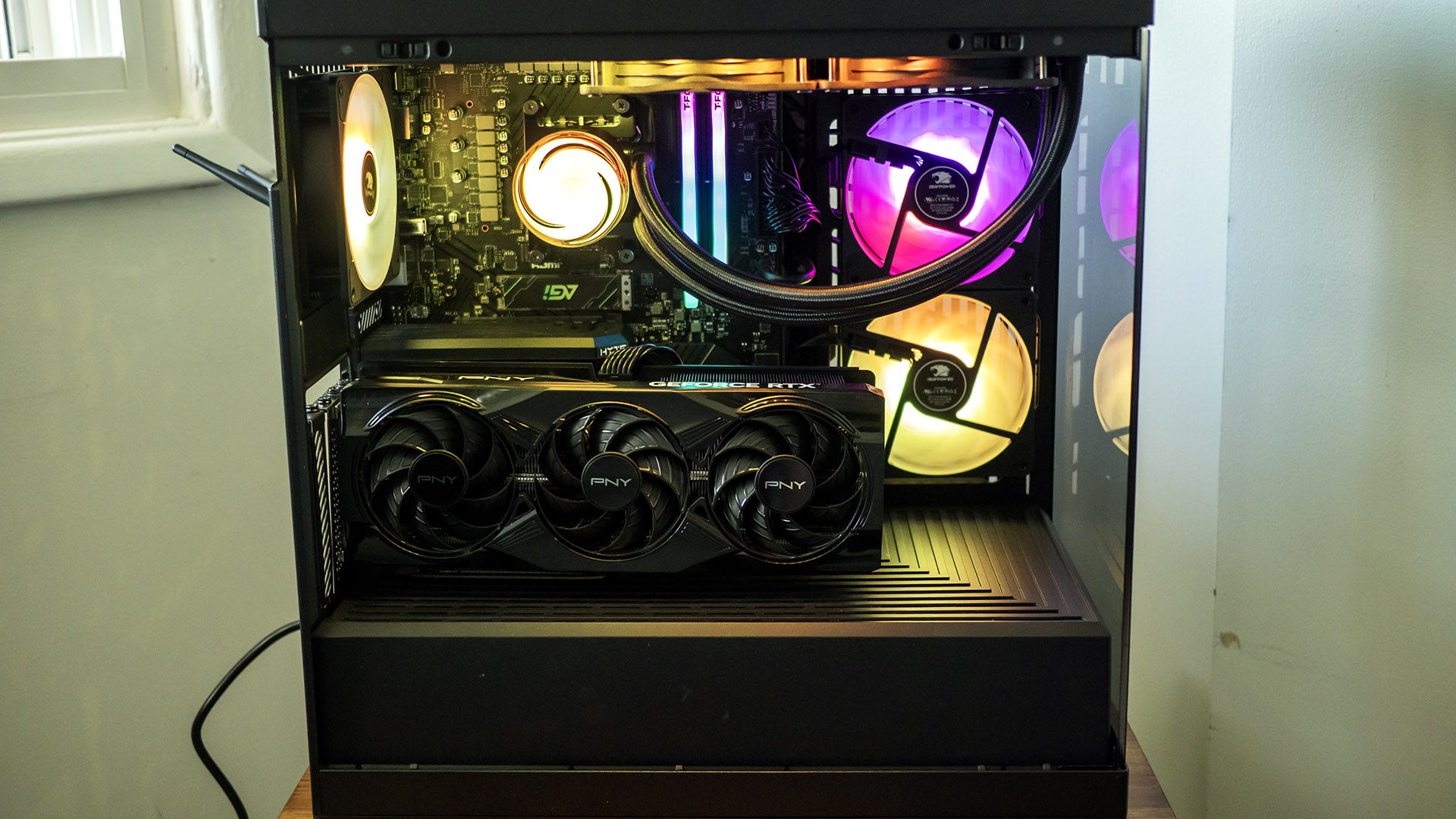
The case itself is sturdy, with generous use of rolled steel. Side panels are secured with metal ball pins that release with a firm pull, a simple and effective solution. That said, a few design choices feel counterintuitive. The right side panel’s dust filter is molded in, making it non-removable – cleaning it requires removing the entire door. The two bottom filters slide out in opposite directions, meaning you’ll likely need to shift the entire tower if it’s placed near a wall. There’s also a dust filter on the top panel, despite it serving as an exhaust rather than an intake.
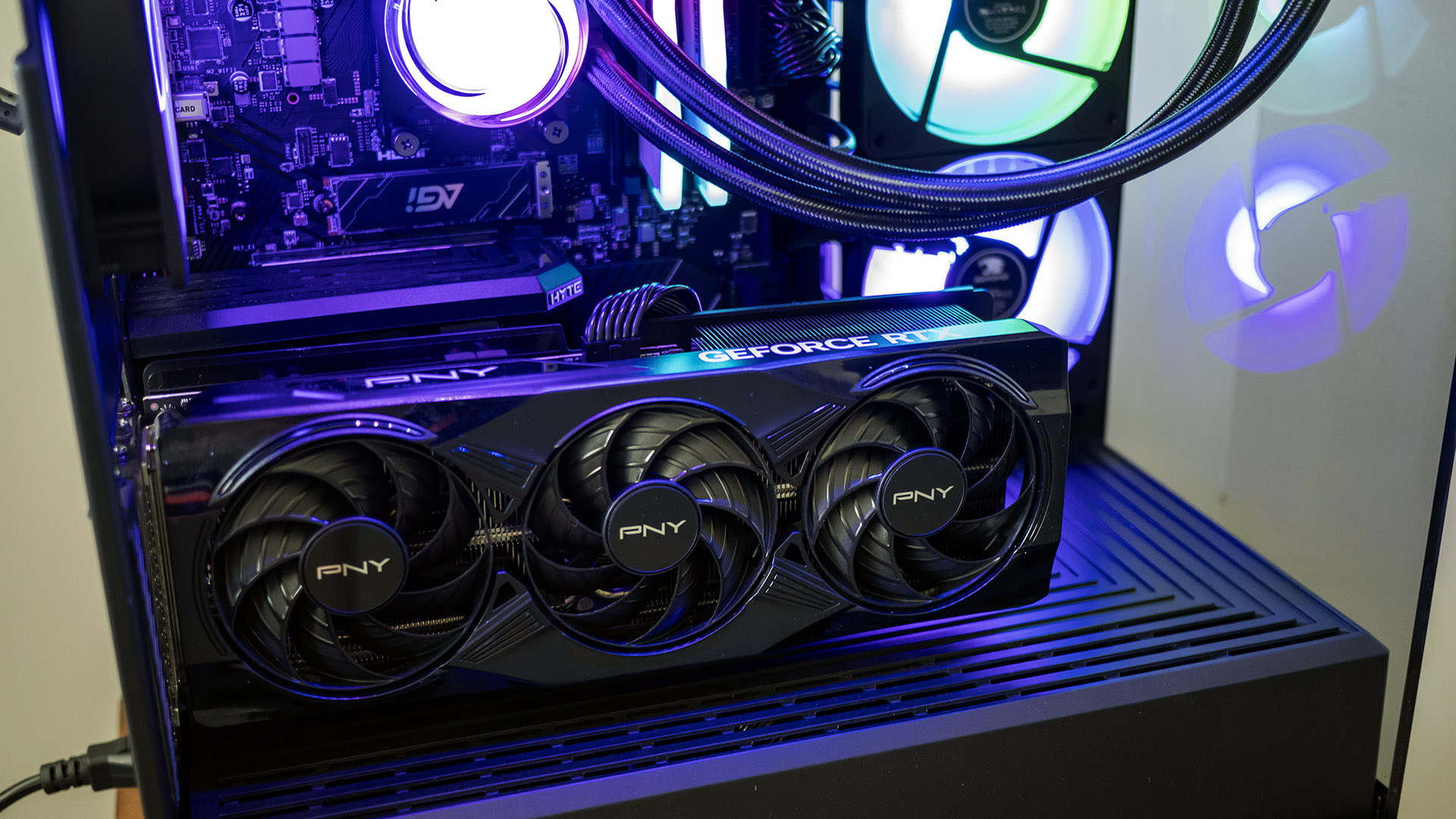
The Y40 Pro’s fan noise proved distracting. Even at idle, the fans remain consistently audible, often rising above ambient household sounds. Thermal management appears poorly tuned, with fan curves reacting aggressively to brief CPU activity spikes. During gaming sessions, noise levels increased noticeably, prompting me to switch to closed-back headphones just to catch subtler in-game sounds. While advanced users can tweak the fan curves in the motherboard BIOS or using an app, this desktop should have come better-tuned out of the box.
iBuyPower Y40 Pro Specifications
CPU | AMD Ryzen 9 7900X |
Motherboard | MSI PRO B650-BC WIFI |
Memory | 32GB DDR5-5200 (2x 16GB) |
Graphics | Nvidia GeForce RTX 5070 Ti (16GB GDDR7, 2,452 MHz boost clock) |
Storage | 2TB SSD (AGI2T0G43AI818) |
Networking | 2.5 Gbps Ethernet, RealTek RZ616 Wi-Fi 6E, Bluetooth 5.3 |
Front Ports | 2x USB Type-A, USB Type-C, 3.5 mm audio |
Rear Ports | USB-C 3.2 Gen 2x2, 7x USB-A 3.2 (3x Gen 2, 4x Gen 1), 3.5 mm audio connectors, DisplayPort, HDMI |
Power Supply | 750 watts, non-modular |
Cooling | 240 mm liquid cooling (iBuyPower) |
Operating System | Windows 11 Home |
Dimensions (WxDxH) | 18.58 x 17.28 x 9.44 inches |
Price (as configured) | $1,899.99 |
Ports and Upgradeability on the iBuyPower Y40 Pro
The Y40 Pro delivers standard connectivity for a mid-tier gaming desktop – nothing unexpected, but nothing lacking either. Up front, you’ll find a 3.5 mm audio jack, two USB Type-A ports, and a USB Type-C port, with the power button centered between the group.
Get Tom's Hardware's best news and in-depth reviews, straight to your inbox.
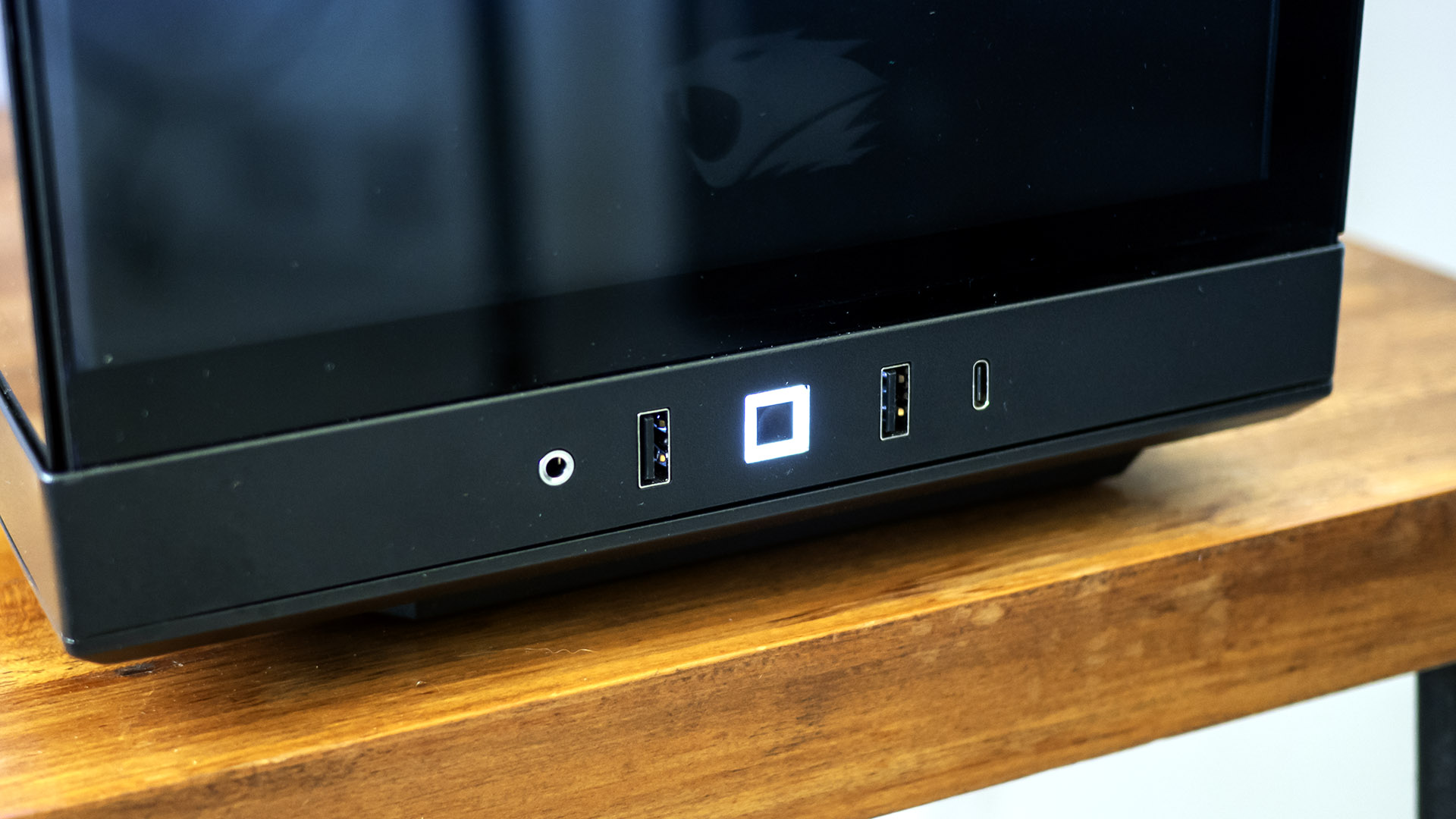
The MSI PRO B650BC motherboard backplane features seven USB-A ports (three rated at 10 Gbps, four at 5 Gbps), a 20 Gbps USB-C port, and six 3.5 mm audio jacks. HDMI and DisplayPort outputs are available if the CPU includes integrated graphics, as our Ryzen 9 7900X test unit does. That said, monitors should be connected to the GPU’s outputs: the RTX 5070 Ti provides one HDMI and three DisplayPort connectors.
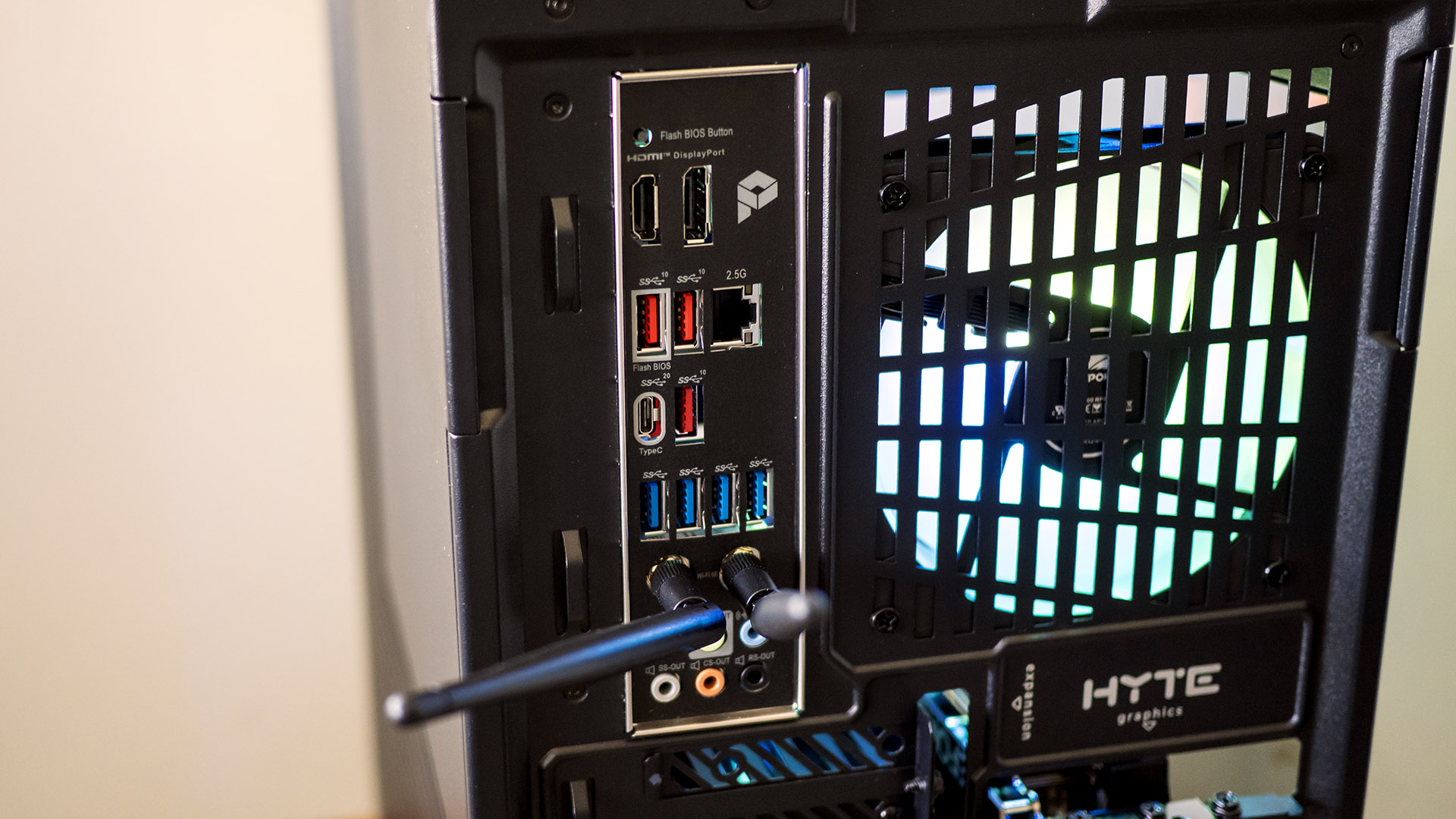
For networking, the system includes a 2.5 Gbps Ethernet port and a RealTek RZ616 wireless card supporting Wi-Fi 6E and Bluetooth 5.3. Note that the external antennas shown in the photos must be attached for reliable wireless performance.
This case’s priority on form over function limits expansion. The vertically mounted GPU obstructs the motherboard’s PCIe slots, ruling out the installation of any additional full-height cards. It’s just something to be aware of when you buy this desktop – most users are not installing additional PCIe cards. That said, you can install a half-height card in either of the remaining slots, one x1 and one x16.
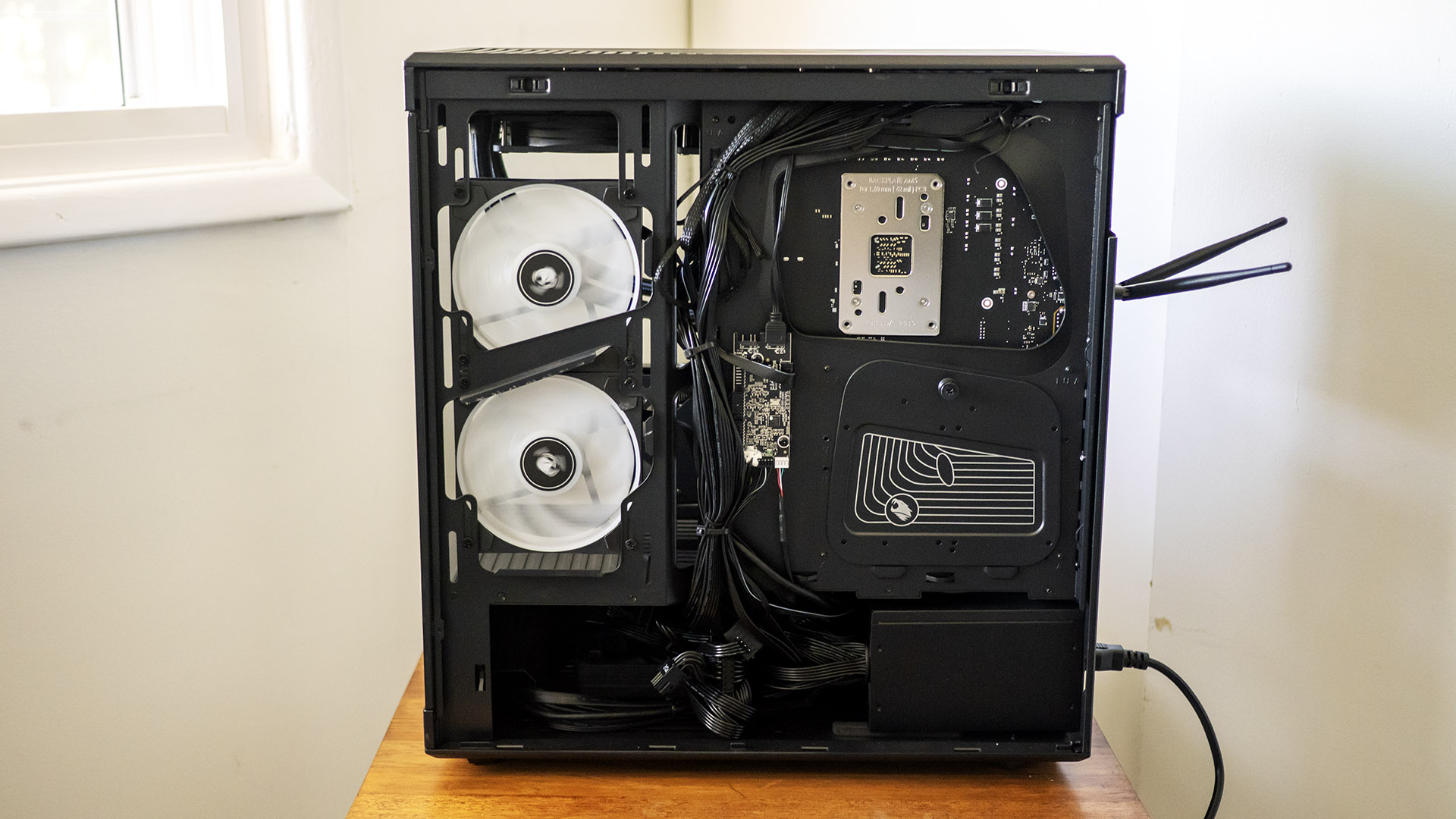
Storage options are surprisingly limited for a case of this size. Aside from the two M.2 slots on the motherboard, the only additional drive support is behind the motherboard, where there’s room for either two 2.5-inch drives or a single 3.5-inch drive. Meanwhile, memory expansion is more forgiving – our test unit has two of the four UDIMM slots open, and the board supports 192GB of RAM.
The 750-watt power supply isn’t modular, but it covers the standard connectors and delivers enough juice for mid- to enthusiast-tier GPUs. With clearance for cards up to 422 mm long, this case shouldn’t hold you back when it’s time to upgrade.
Gaming and Graphics on the iBuyPower Y40 Pro
Our Y40 Pro test configuration features a Ryzen 9 7900X CPU, GeForce RTX 5070 Ti GPU, and 32GB of DDR5-5200 RAM.
For my game testing, I fired up F1 24 and played at the game’s Ultra preset at 3840 x 2160 with DLSS enabled, seeing anywhere from the high-80 to the low-100 frames per second range. The gameplay was exceptionally smooth.
We compared the Y40 Pro to two other gaming desktops: the Asus ROG G700 ($2,029 as tested) features an Intel Core Ultra 7 265KF, though it sticks with the vanilla GeForce RTX 5070, while the Corsair Vengeance a7500 ($2,799) pairs the gaming-focused Ryzen 7 9800X3D with an RTX 5070 Ti. While the Corsair and the iBuyPower have similar GPUs, we'll see some big performance gaps at 1080p due to the CPU, which also makes the Corsair far more expensive.
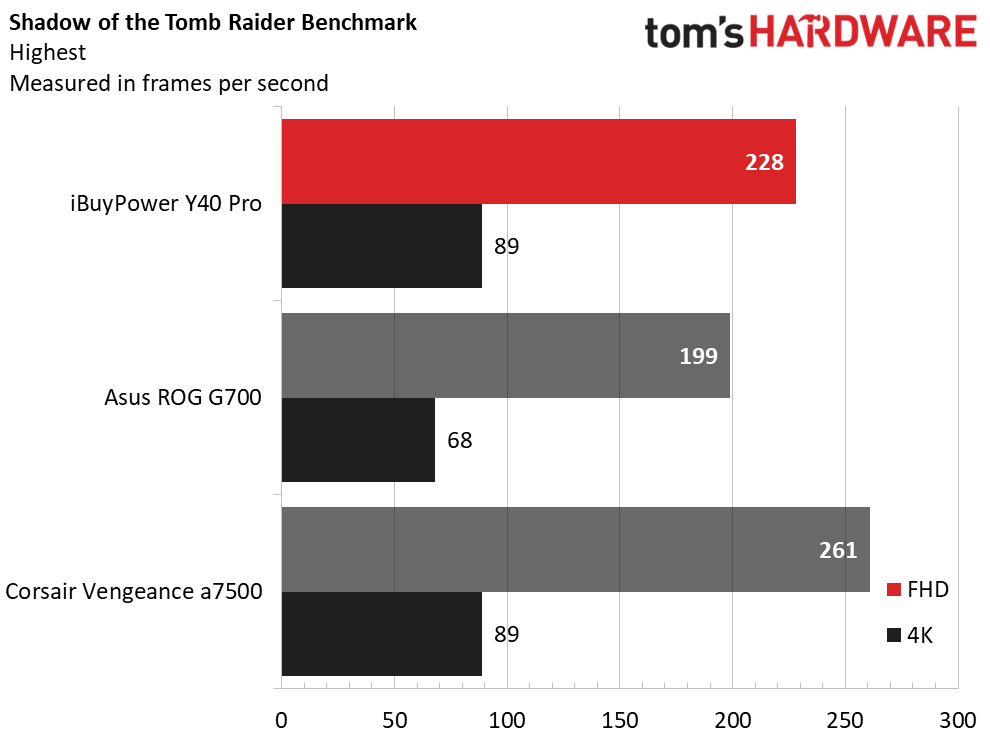
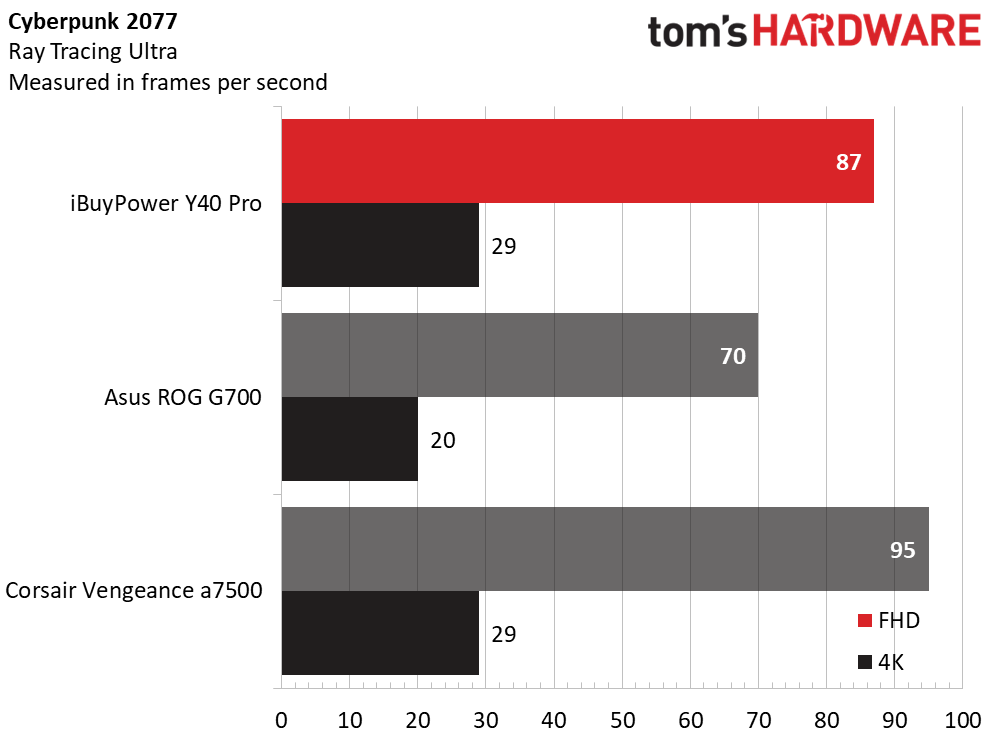
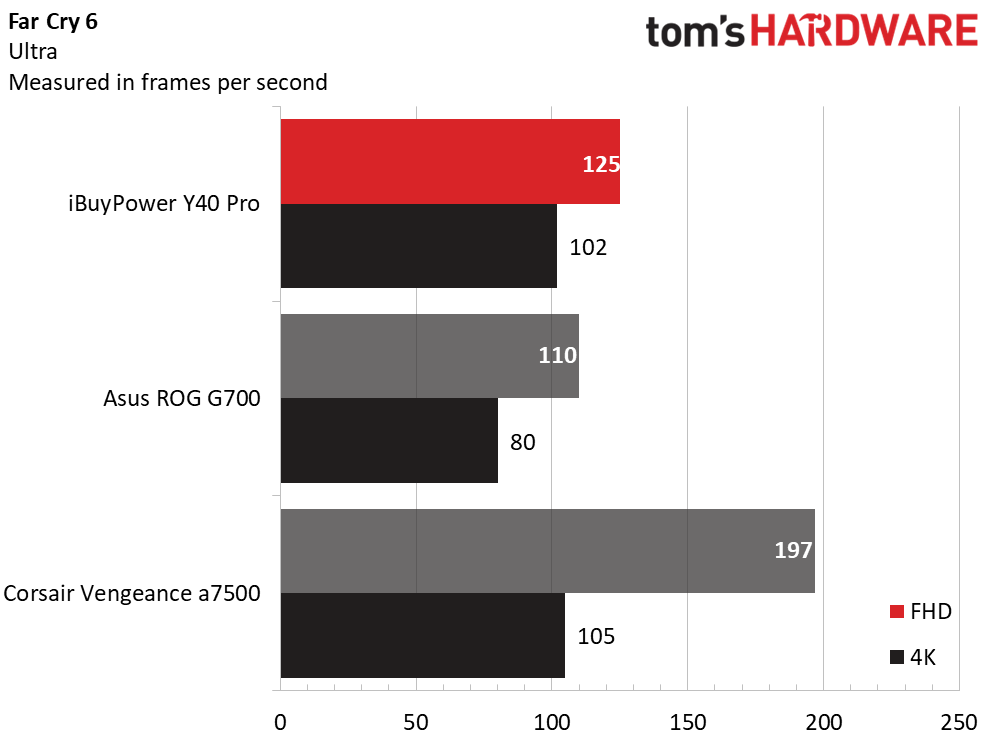
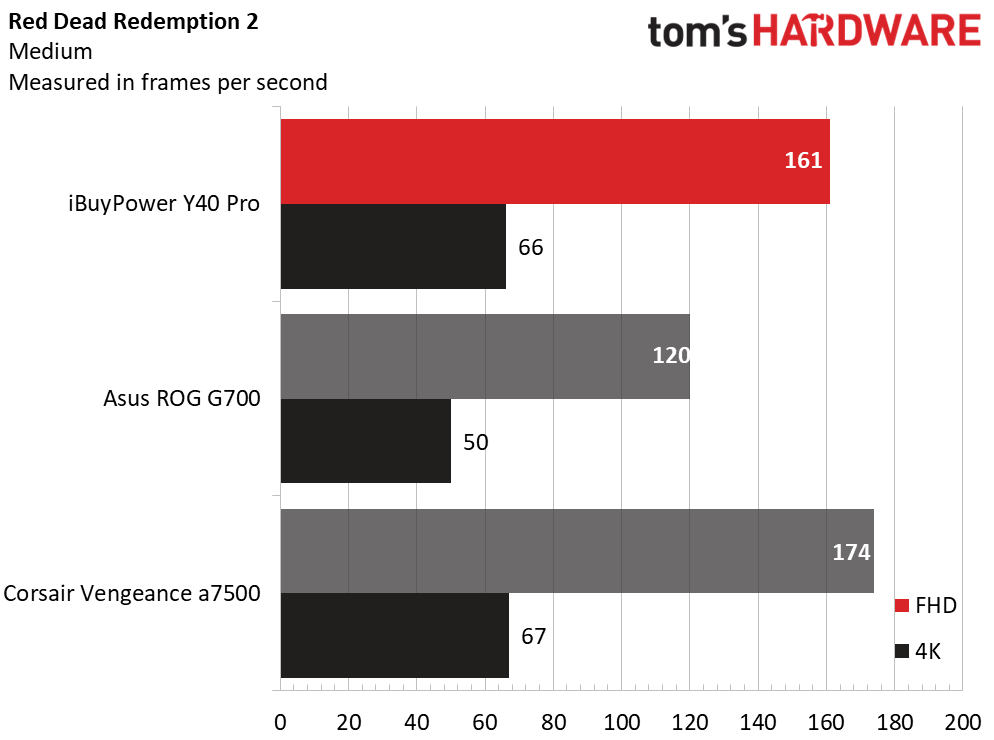
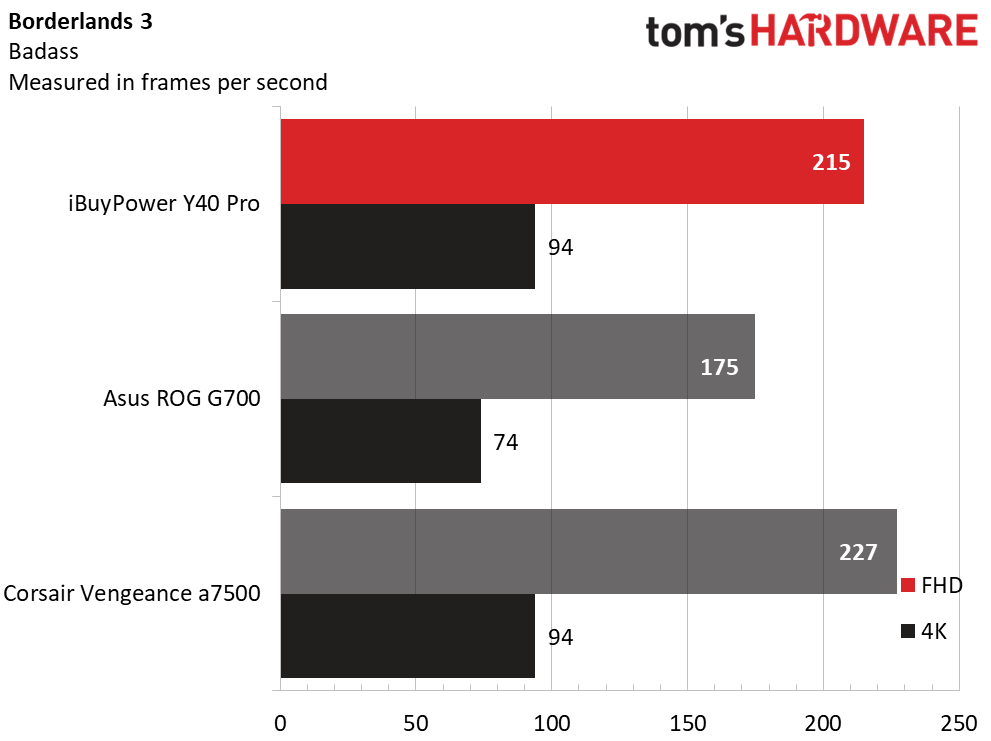
Starting with Shadow of the Tomb Raider at the Highest detail preset, the Y40 Pro trailed the Corsair significantly at the CPU-bound 1080p resolution, with 228 FPS versus the Corsair’s 261 FPS. At 4K, however, both systems leveled out at 89 FPS. The RTX 5070-powered Asus predictably fell behind, posting 199 FPS at 1080p and 68 FPS at 4K.
In Cyberpunk 2077's demanding Ray Tracing Ultra preset, the Y40 Pro narrowed the gap, achieving 87 FPS at 1080p compared to the Corsair’s 95 FPS. At 4K, both machines converged again, each producing 29 FPS.
Far Cry 6 at Ultra settings showed a wider disparity at 1080p, with the Y40 Pro reaching 125 FPS while the Corsair surges ahead at 197 FPS. At 4K, the performance is almost identical. The Asus sits between the two, with 110 FPS at 1080p and 80 FPS at 4K.
In Red Dead Redemption 2 (Medium preset), the Y40 Pro clocked in at 161 FPS at 1080p, just behind the Corsair’s 174 FPS. At 4K, the difference is negligible: 66 FPS for the Y40 Pro and 67 FPS for the Corsair. The Asus trailed again, with 120 FPS at 1080p and 50 FPS at 4K.
Finally, in Borderlands 3 at the “Badass” preset, the Y40 Pro stayed competitive, posting 215 FPS versus the Corsair’s 227 FPS at 1080p. Both systems match at 94 FPS at 4K. The Asus finished with 175 FPS and 74 FPS, respectively.
Overall, the Y40 Pro delivers stable gaming performance, though it falls short of the Corsair in CPU-intensive titles and lower resolutions, where the Ryzen 7 9800X3D clearly extracts more from the RTX 5070 Ti. At 4K, where GPU limitations are apparent, the two systems perform nearly identically. Since the Y40 Pro is also available with the Ryzen 7 9800X3D, its performance gap isn’t necessarily a strike against it, though as of this review, no RTX 5070 Ti configuration was available with that chip (see the configuration section for more).
To evaluate sustained gaming performance, we run 15 loops of the Metro Exodus stress test at RTX settings. During the approximately 30-minute test, the Y40 produced an average framerate of 163 FPS across all runs, with almost no variation between runs. The Ryzen 9 7900X maintained an average temperature of just 50 degrees Celsius while the GeForce RTX 5070 Ti averaged 61 C.
Productivity Performance on the iBuyPower Y40 Pro
The Y40 Pro is built for high-performance productivity, featuring a Ryzen 9 7900X processor, 32GB of RAM, and a 2TB PCIe Gen4 SSD.
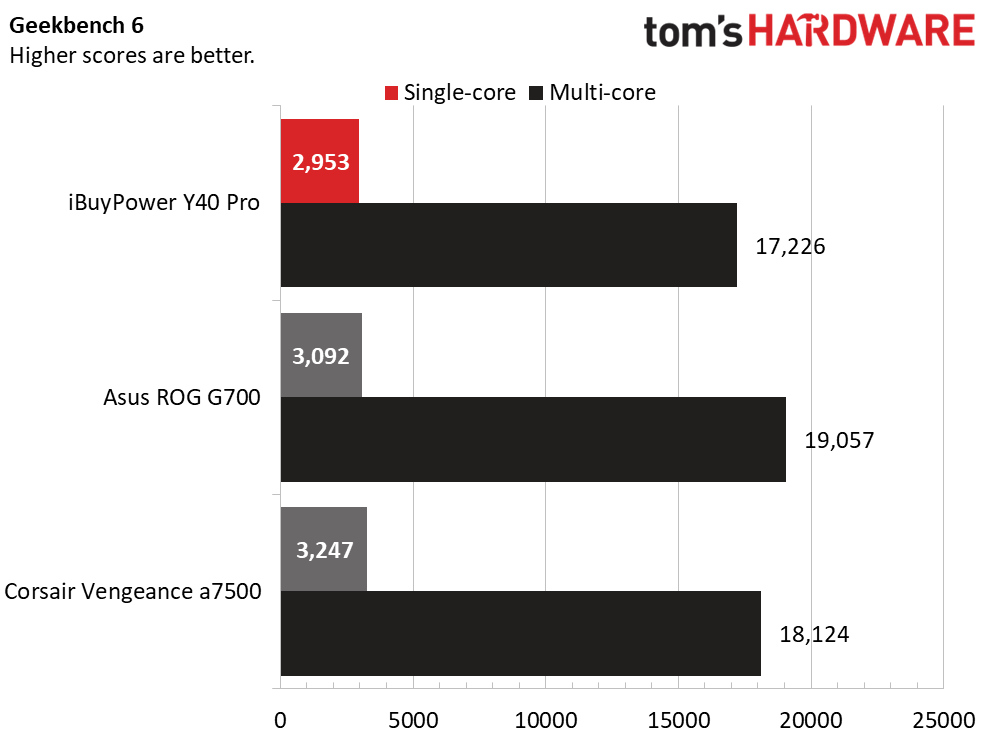
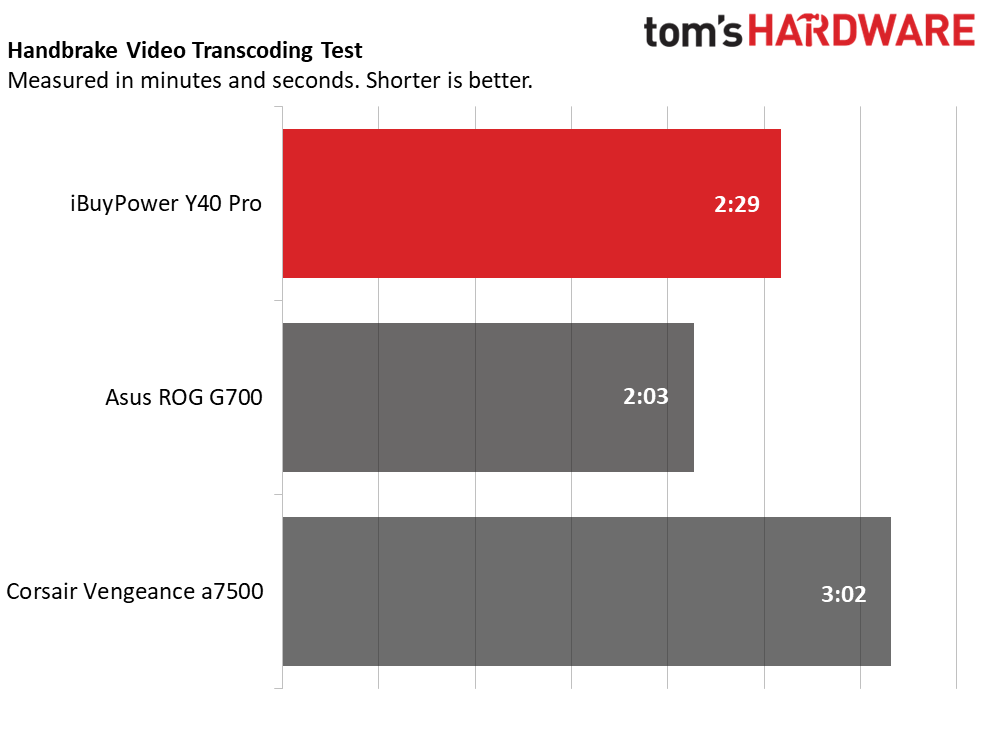
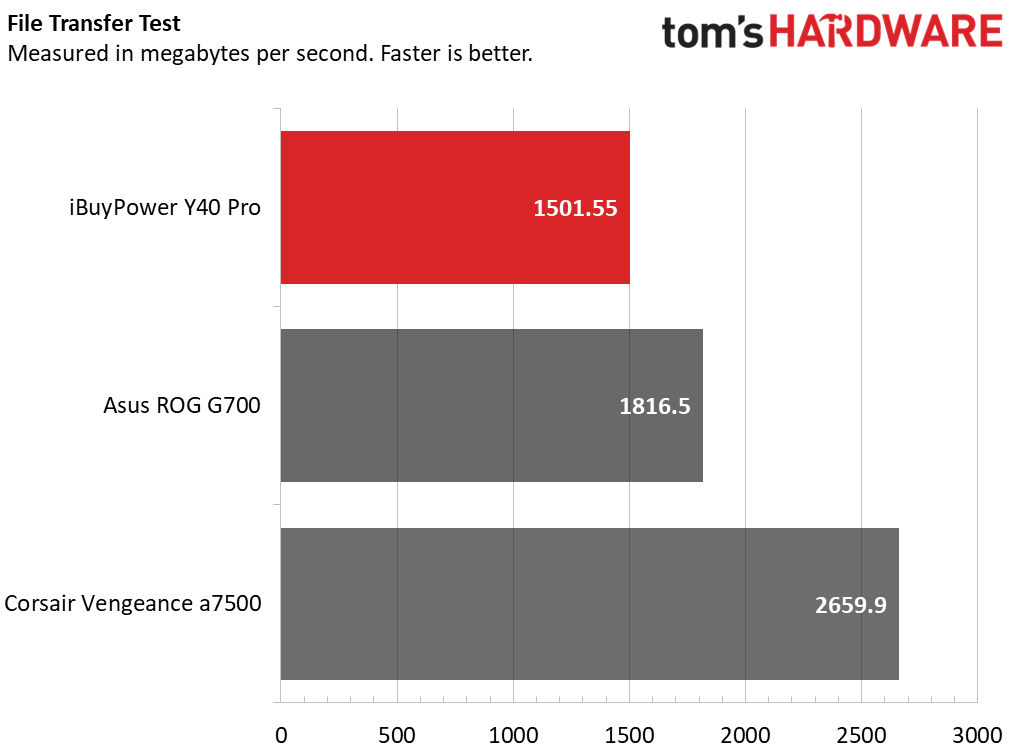
In Geekbench 6’s synthetic CPU test, the Y40 Pro landed behind its rivals in both single- and multi-core scores. It posted 2,953 points in single-core, just shy of the Asus’ 3,029 and well below the Corsair’s leading 3,247. Multi-core results followed a similar pattern, with the Y40 Pro scoring 17,226 compared to 19,057 for the Asus and 18,124 for the Corsair.
The Y40 Pro also lagged in our 25GB file transfer test, where its SSD delivered 1,501.6 MBps. That’s notably slower than the Asus at 1,816.5 MBps and far behind the Corsair’s impressive 2,659.9 MBps.
In our Handbrake video transcode test (4K to 1080p), the Y40 Pro redeemed itself slightly, finishing in 2 minutes and 29 seconds to be second fastest overall. It trailed the Asus (2:03) but outpaced the Corsair (3:02).
Performance may improve with the newer Ryzen 9 9700X configuration, which could help close the gap in CPU-heavy workloads. As noted in the Configurations section of this review, iBuyPower offers many different CPUs in this tower, including Intel chips.
Keyboard and Mouse with the iBuyPower Y40 Pro
iBuyPower bundles its Chimera K7 RGB mouse and keyboard with the Y40 Pro, which are basic peripherals but a cut above the generic kits often tossed in with mainstream desktops.
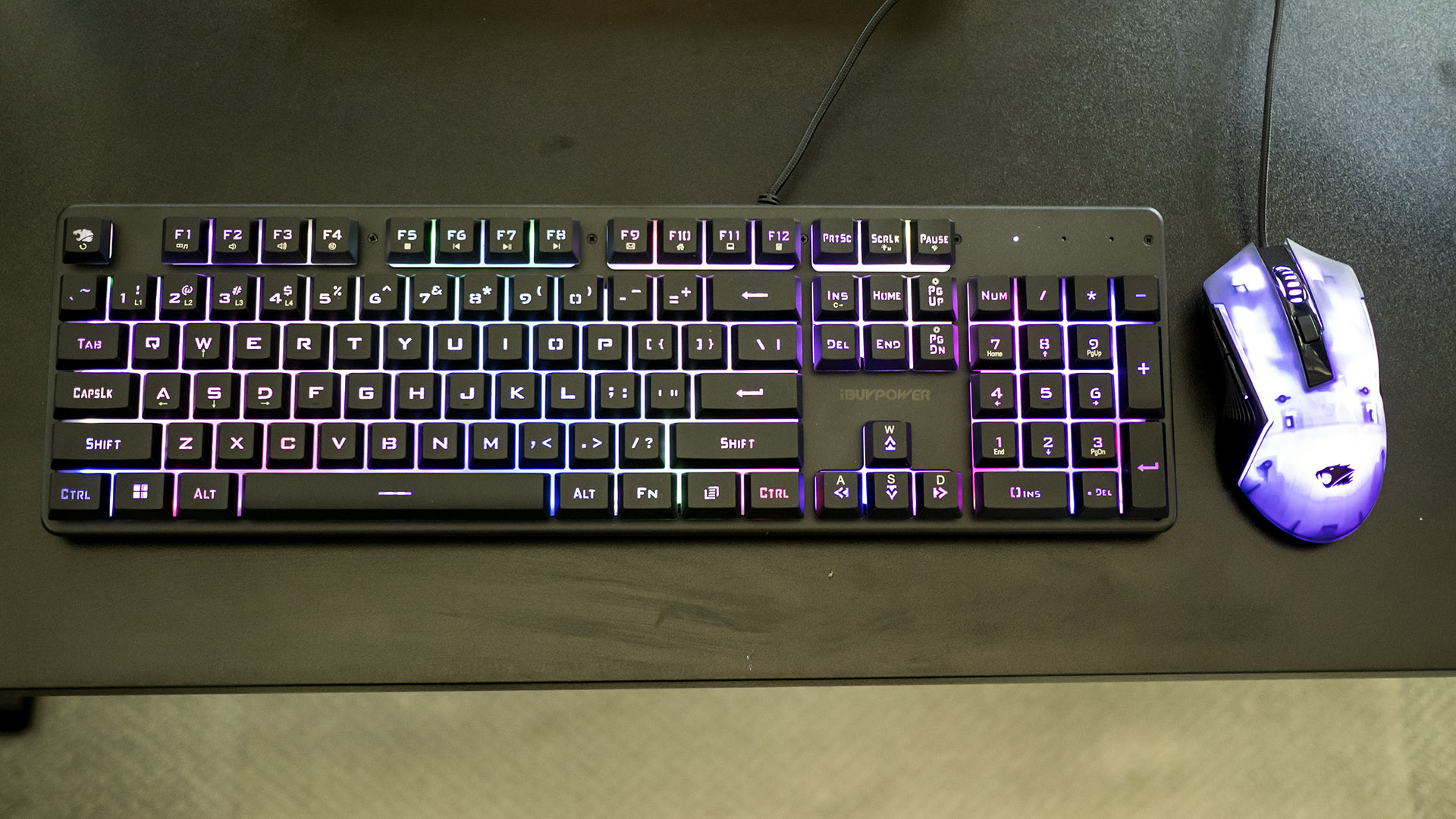
The Chimera K7 mouse sports a gamer-friendly shape that fits comfortably in medium-sized hands, though it’s designed exclusively for right-handed users. While the primary buttons and scroll wheel feel like nothing special, it does include two side buttons and a DPI toggle behind the wheel. A dedicated RGB switch on the underside cycles through ten LED modes, including off. The lighting is impressively bright, with effects like breathing, strobing, solid color, and a starlight mode that illuminates sections of the mouse in sequence.
Despite its membrane construction, the keyboard delivers a surprisingly tactile typing experience. I had no trouble maintaining my usual speed of about 120 words per minute and near-perfect accuracy on MonkeyType. It lacks premium features like USB passthroughs, but compensates with vibrant RGB backlighting across multiple colors. Lighting is controlled directly via Fn+ScrollLock, with options for static or breathing effects, and can be disabled using Fn+Pause. Flip-out feet provide a slight incline for ergonomic comfort, though iBuyPower unfortunately doesn’t include a palm rest.
Software and Warranty
Besides the usual smattering of Windows 11 default apps, iBuyPower preloads no software onto the Y40 Pro, which is mostly great. I had to install MSI Center myself for RGB lighting control.
iBuyPower backs the Y40 Pro with an industry standard one-year warranty.
iBuyPower Y40 Pro Configurations
iBuyPower offers a vast selection of prebuilt desktops, including fully customized systems on its website. Our Y40 Pro test unit, a $2,099 model from Amazon, uses the older Ryzen 7 7900X CPU; an $1,899 version at Best Buy swaps in the Ryzen 9 9700X and keeps all other specifications the same, including the GeForce RTX 5070 Ti, 32GB of RAM, and a 2TB SSD.
Other configurations available at Best Buy begin at $1,499 with a Ryzen 7 9800X3D and Radeon RX 7800 XT, followed by a $1,599 model with a Ryzen 7 8700F and RTX 5070, and a $1,699 option pairing a Ryzen 7 7800X3D with a Radeon RX 9070. Higher-tier models include a $1,999 build with a Ryzen 7 9800X3D and Radeon RX 9070XT, and a $2,299 version matching our test unit’s specs but upgraded to a Ryzen 9 9900X. Systems featuring the RTX 5080 start at $2,499, with the flagship $2,999 configuration combining that GPU with a Ryzen 9 9900X.
iBuyPower is competitive on price: a similarly equipped Corsair Vengeance a7500 was listed at $2,899 with a Ryzen 7 7800X3D and 1TB SSD, Alienware’s Aurora came in at $1,949 with a Core Ultra 7 265KF, and the Asus ROG G700 was priced at $2,399 with a Ryzen 7 9800XD.
Bottom Line
iBuyPower’s Y40 stands out visually and delivers solid mid-tier gaming performance, backed by decent build quality and ample connectivity. Above-average peripherals and competitive pricing further enhance its value proposition.
That said, noticeable fan noise detracts from the overall experience, and the limited RGB customization may disappoint users seeking more personalization. While most won’t need to expand storage or install additional full-height PCIe cards, it’s worth noting that the chassis offers little flexibility in those areas.
Ultimately, the Y40 Pro is among the more stylish mid-towers we’ve tested and holds its own against competitors like the Asus ROG G700. Still, for those prioritizing acoustic performance, the quieter G700 earns our preference.

Charles Jefferies is a freelance reviewer for Tom’s Hardware US. He covers laptop and desktop PCs, especially gaming models.
